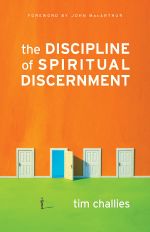"The Discipline of Spiritual Discernment" Blog Tour
 Author Tim Challies has embarked on a “blog tour” to promote the release of his new book, The Discipline of Spiritual Discernment. A blogger on the tour will pose a question about discernment, and Tim will address the question and the comments that readers might have.
Author Tim Challies has embarked on a “blog tour” to promote the release of his new book, The Discipline of Spiritual Discernment. A blogger on the tour will pose a question about discernment, and Tim will address the question and the comments that readers might have.
The questions SI posed to Tim are as follows, accompanied by his responses.
Gift of discernment: “[Gene Apple, the lead pastor at Willow] said, ‘The primary spiritual gift that they look for in an elder is: the gift of discernment. … People with the gift of discernment have the uncanny ability to make the right call.” —Joe Z’s talk.
http://www.buildingchurchleaders.com/articles/2002/le-2002-001-11.80.html
See especially the last section: Promptings of the Holy Spirit.
How does Scripture tell us to view discernment as a step of rational thought guided by the Holy Spirit, rather than a supra-rational sixth sense?
 In my research for this book and in discussions I’ve had since writing it, I’ve seen that the single most common misunderstanding about discernment is that it is somehow an intuitive practice—that it is a sense more than actual brain work. And that is exactly what this article teaches. It places discernment firmly in the camp of feeling and extra-biblical revelation which involves the Spirit somehow communicating to us through our thoughts or feelings. The Bible, though, teaches that discernment is a skill and that it is a practice of the mind more than the “heart” or “spirit.” Hebrews 5:14 tells us that discernment is a skill that is developed by constant practice and Romans 12:2 says that, in order to be men and women of discernment, we must have our minds renewed. In these passages and others we see that discernment is more than intuition and more than new revelation. Instead, discernment is examining the revelation God has already given us and, from there, determining what we are to believe about Him and how He requires we live. We do not expect the Spirit to say within us a “Yes” or “No.” Rather, we turn to God’s Words in the Bible and there find what He would have us believe and have us do.
In my research for this book and in discussions I’ve had since writing it, I’ve seen that the single most common misunderstanding about discernment is that it is somehow an intuitive practice—that it is a sense more than actual brain work. And that is exactly what this article teaches. It places discernment firmly in the camp of feeling and extra-biblical revelation which involves the Spirit somehow communicating to us through our thoughts or feelings. The Bible, though, teaches that discernment is a skill and that it is a practice of the mind more than the “heart” or “spirit.” Hebrews 5:14 tells us that discernment is a skill that is developed by constant practice and Romans 12:2 says that, in order to be men and women of discernment, we must have our minds renewed. In these passages and others we see that discernment is more than intuition and more than new revelation. Instead, discernment is examining the revelation God has already given us and, from there, determining what we are to believe about Him and how He requires we live. We do not expect the Spirit to say within us a “Yes” or “No.” Rather, we turn to God’s Words in the Bible and there find what He would have us believe and have us do.
If I use my knowledge of Scripture to judge some action as evil, and this discernment seems clear, how should I view my brother who does not make the same discernment?
As we live in this fallen world, we will constantly find ourselves in the company of Christians who do not understand God in the ways we do. When we find ourselves in such a situation, we must first pause to determine just how important a doctrine this is. In The Discipline of Spiritual Discernment I follow the trail blazed by Dr. Mohler in his article about theological triage. Mohler suggests we should understand three levels of doctrine. The first level contains issues relating to the very heart of the Christian faith—the gospel message, the person and work of Jesus Christ, and so on. These are doctrines for which we can allow no disagreement. All Christians must hold these in beliefs in common. The second level is areas on which we may disagree and areas that would be significant roadblocks to any kind of local church fellowship. Yet we joyfully maintain unity around the gospel and work together to further the gospel and to encourage each other. This might include issues such as baptism. And then there are third-level issues which are doctrines where we may disagree even when maintaining close fellowship in the same local church. Here we might see issues related to spiritual gifting or the end times.
So when you judge an action to be evil or wrong, you will first want to see just how important an issue it is. If it is an issue that strikes right to the heart of the faith, you will want to address the issue immediately and firmly, though always with love and humility. It may require church discipline or disassociation. But if you find it is a second or third-level issue, you will want to first affirm your common fellowship and from there seek to understand whether this disagreement must preclude you from close fellowship or if it is a disputable matter than should not inhibit close communion.
In the same situation, how should I treat my discernment when no one around me agrees?
Again, you will want to first determine just how serious an issue this is. If you are able to determine that it is merely a disputable matter, than your love for the body of Christ will warn you against blowing it up into a huge issue. However, if you find that it is something that would preclude you from fellowship with a group, you will want to proceed very carefully. You’ll want to ask wise and mature Christians for their input and will want to look to the creeds and confessions of the church to see how Christians of days past have understood the issue. It may be that God is using this issue to move you out of a dying church; of course it may also be that Satan is using the issue to use you to divide a God-honoring church. So proceed humbly, cautiously, prayerfully and with a heart saturated with Scripture.
What about if I discern an action to clearly be good, how then should I view my brother who judges that to be evil?
Once more you will want to first identify the seriousness of the issue. Your reaction will depend a great deal on how close this issue is to the heart of the Christian faith. Assuming that this is not a first-level issue, this may well represent a time to express humility and a time to keep in mind the “weaker brother” principle. For example, a person who believes strongly in the free expression of certain spiritual gifts may wish to refrain from such expressions at certain times and a person whose conscience is not offended by images of Jesus on a PowerPoint slide in worship may wish to keep certain images out of the rotation at times lest he offend people who feel such an image is in violation of the second commandment. We do such things as an expression of love for our brothers and sisters in the Lord and as proof of a God-given desire to esteem others higher than ourselves. We build true Christian unity by humility.
Here is a link for more information about Tim Challies’ “The Discipline of Spiritual Discernment”
- 1 view


Discussion